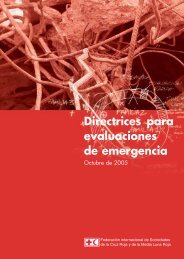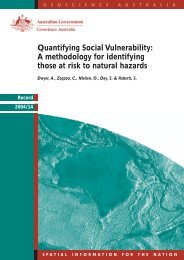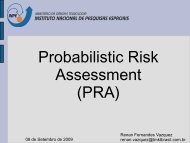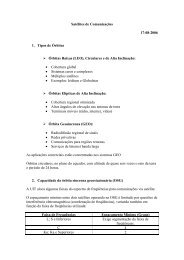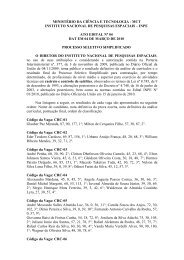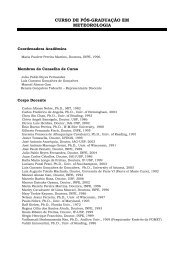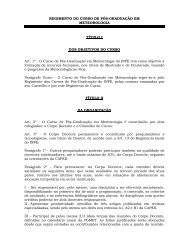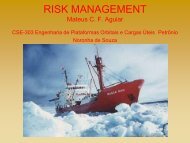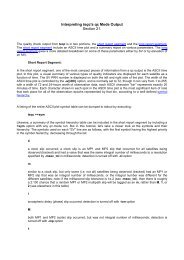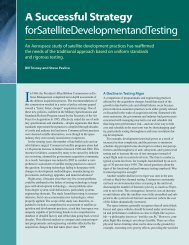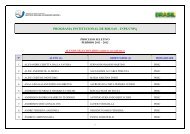Living with Risk. A global review of disaster reduction initiatives
Living with Risk. A global review of disaster reduction initiatives
Living with Risk. A global review of disaster reduction initiatives
Create successful ePaper yourself
Turn your PDF publications into a flip-book with our unique Google optimized e-Paper software.
6<br />
<strong>Living</strong> <strong>with</strong> <strong>Risk</strong>: A <strong>global</strong> <strong>review</strong> <strong>of</strong> <strong>disaster</strong> <strong>reduction</strong> <strong>initiatives</strong><br />
Specialized agencies and other autonomous organizations and <strong>disaster</strong> <strong>reduction</strong><br />
Organizations and agencies part <strong>of</strong> the United Nations system carry out active programmes in<br />
support <strong>of</strong> <strong>disaster</strong> <strong>reduction</strong> and many <strong>of</strong> them have strengthened their <strong>disaster</strong> <strong>reduction</strong><br />
capacity in their respective areas <strong>of</strong> competence during recent years. All agencies and<br />
programmes work <strong>with</strong> national or local authorities and in many cases <strong>with</strong> civil society organizations<br />
and groups.<br />
308<br />
Programmes and funds<br />
United Nations Development Programme<br />
The overarching mission <strong>of</strong> UNDP is to help<br />
countries build national capacity to achieve<br />
sustainable human development. The<br />
Programme is giving top priority to the elimination<br />
<strong>of</strong> poverty and the building <strong>of</strong> equity by<br />
providing development advice, advocacy and<br />
grant support. UNDP, <strong>with</strong> headquarters in<br />
New York and specific functions in Geneva,<br />
delivers most <strong>of</strong> its services through its 132<br />
country <strong>of</strong>fices, supported by regional bureaux,<br />
specialized programmes and trust funds. In each<br />
country <strong>of</strong>fice, the UNDP resident representative<br />
normally also serves as the resident coordinator<br />
for the United Nations system as a whole.<br />
UNDP is the most substantive United Nations<br />
programme to promote and support the implementation<br />
<strong>of</strong> risk and vulnerability <strong>reduction</strong> in<br />
developing countries. In 1997, a General<br />
Assembly decision transferred the responsibilities<br />
<strong>of</strong> the Emergency Relief Coordinator (head<br />
<strong>of</strong> OCHA) for operational activities for natural<br />
<strong>disaster</strong> mitigation, prevention and preparedness<br />
to UNDP while OCHA retained its coordination<br />
function <strong>of</strong> international relief operations.<br />
UNDP has been a member <strong>of</strong> the ISDR Inter-<br />
Agency Task Force for Disaster Reduction since<br />
its inception and chairs the Working Group on<br />
<strong>Risk</strong>, Vulnerability and Impact Assessment.<br />
The UNDP Bureau for Crisis Prevention and<br />
Recovery (BCPR)-formerly known as the<br />
Emergency Response Division (ERD)-is the inhouse<br />
mechanism set up to provide a quicker<br />
and more effective response in Countries in<br />
Special Development Situations (CSDS)<br />
through the provision <strong>of</strong> services. As part <strong>of</strong><br />
BCPR, the Geneva-based Disaster Reduction<br />
and Recovery Programme (DRRP) focuses on<br />
promoting and supporting capacity-building<br />
and/or strengthening <strong>of</strong> appropriate regional<br />
organizations, national authorities and institutions<br />
for mitigation, prevention and preparedness<br />
<strong>of</strong> natural, technological/industrial and<br />
environmental <strong>disaster</strong>s, through a structure <strong>of</strong><br />
regional advisers. Main functions <strong>of</strong> DRRP<br />
include support to preventive development and<br />
training by:<br />
• Assessing vulnerability to crises and natural<br />
<strong>disaster</strong>s;<br />
• Establishing early warning systems;<br />
• Developing and maintaining a framework <strong>of</strong><br />
developmental responses and other contingency<br />
<strong>disaster</strong> plans;<br />
• Forming and strengthening country United<br />
Nations <strong>disaster</strong> management teams;<br />
• Integrating <strong>disaster</strong> preparedness, mitigation,<br />
prevention and response programmes into<br />
national development programmes;<br />
• Regular reporting and updating <strong>of</strong> important<br />
developments in CSDS, as a part <strong>of</strong> the early<br />
warning process;<br />
• Contributing to human resource development<br />
by improving capabilities in risk and vulnerability<br />
analyses; planning for contingencies;<br />
designing responsive structures; implementing<br />
prevention and mitigation strategies for<br />
<strong>disaster</strong> and crisis.<br />
BCPR New York<br />
UNDP-1 UN Plaza<br />
New York, NY 10017, United States<br />
Tel: (+1-212) 906 5194<br />
Fax: (+1-212) 906 5379<br />
E-mail: erd@undp.org<br />
Web site: www.undp.org/erd/disred/index.htm<br />
BCPR Geneva<br />
11 Chemin des Anémones, Châtelaine<br />
CH-1219 Geneva, Switzerland<br />
Tel: (+41-22) 917 8540<br />
Fax: (+41-22) 917 8060<br />
E-mail: erd.gva@undp.org<br />
Web site:<br />
www.undp.org/erd/disred/index.htm



